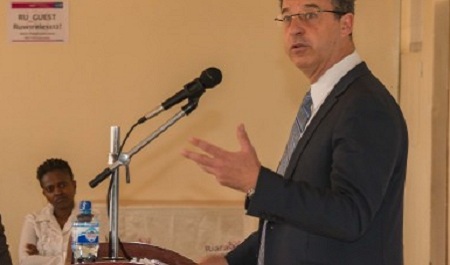
Public lecture by Dr Serge Brammertz
On 27th January 2015, RU was privileged to host Dr Serge Brammertz, Chief Prosecutor of the International Criminal Court for the former Yugoslavia, for a public guest lecture which took place in room G15.
The lecture was on the “Challenges of International Criminal Investigations and Prosecutions”. The essence of the lecture was to give RU students a glimpse into prosecution work from the vantage point of a highly successful domestic and international prosecutor. Below is a summary of some key points discussed at the lecture.
Beginnings: Dr Brammertz was raised in a humble family in Belgium. His family was German-speaking, and his schooling was in French. He emphasized that language skills have given him an advantage in his work as an international criminal prosecutor. He always wanted to be a prosecutor so the decision to go to law school was rather easy to make. Belgium gave him another advantage. It was the first country to assert universal jurisdiction and initiate international criminal prosecution in relation to the Rwanda genocide.
Benefits of International Criminal Justice: Dr Brammertz started with the positive attributes of international criminal justice. To start with, a number of specialized courts have been established to deal with atrocities including the tribunals on Sierra Leone, Rwanda, Cambodia, Lebanon, and Yugoslavia. Others are in formation, for instance one to deal with the atrocities committed in South Sudan. These are established under the Security Council. The ICC on the other hand was established under treaty, the Rome Statute. Dr Brammertz noted that the jurisprudence developed by these international courts is often more advanced than that developed by most domestic courts. He gave the example of jurisprudence that has emerged allowing for conflict related sexual violence to be prosecuted as an international crime. International courts also ensure prosecution of serious crimes when national legal systems lack capacity to investigate and prosecute or lack political will.
Challenges of International Criminal Justice: Dr Brammertz acknowledged that sometimes prosecution of serious crimes has appeared selective. He attributed this to two things. First, the nature of the conflict may not allow for successful investigation and prosecution, for instance, if the conflict is on-going and politically difficult to deal with. He said in some instances, but not all, political resolution of conflict could achieve much more than prosecution. Second, in the case of the prosecution under the Rome Statute, if states have not become parties to the treaty, investigation and prosecution is hindered. Decisions of the international courts can be lengthy and difficult to read. Excellent investigation and prosecution skills are a must. Witness protection is vital yet it can be a very expensive affair. It can also take a long time to conclude the cases because of their complexity.
[metaslider id=6604]



